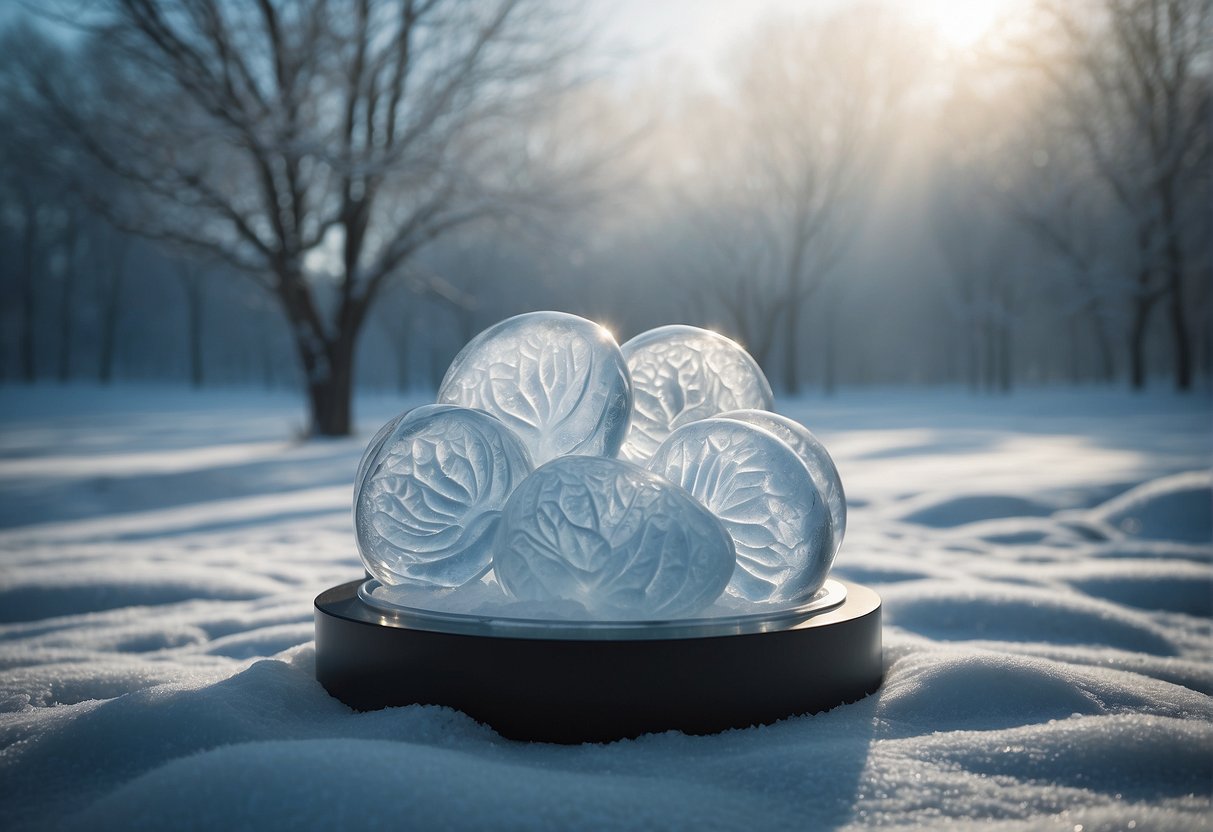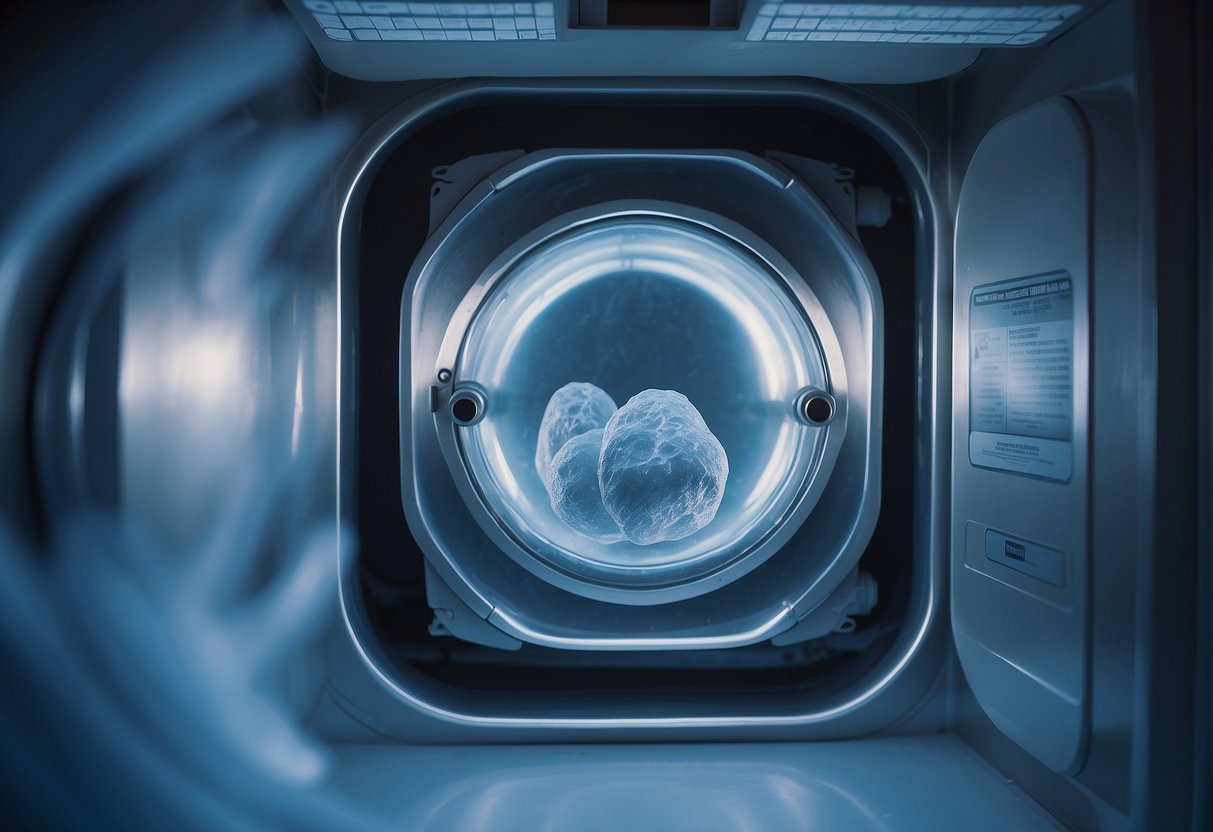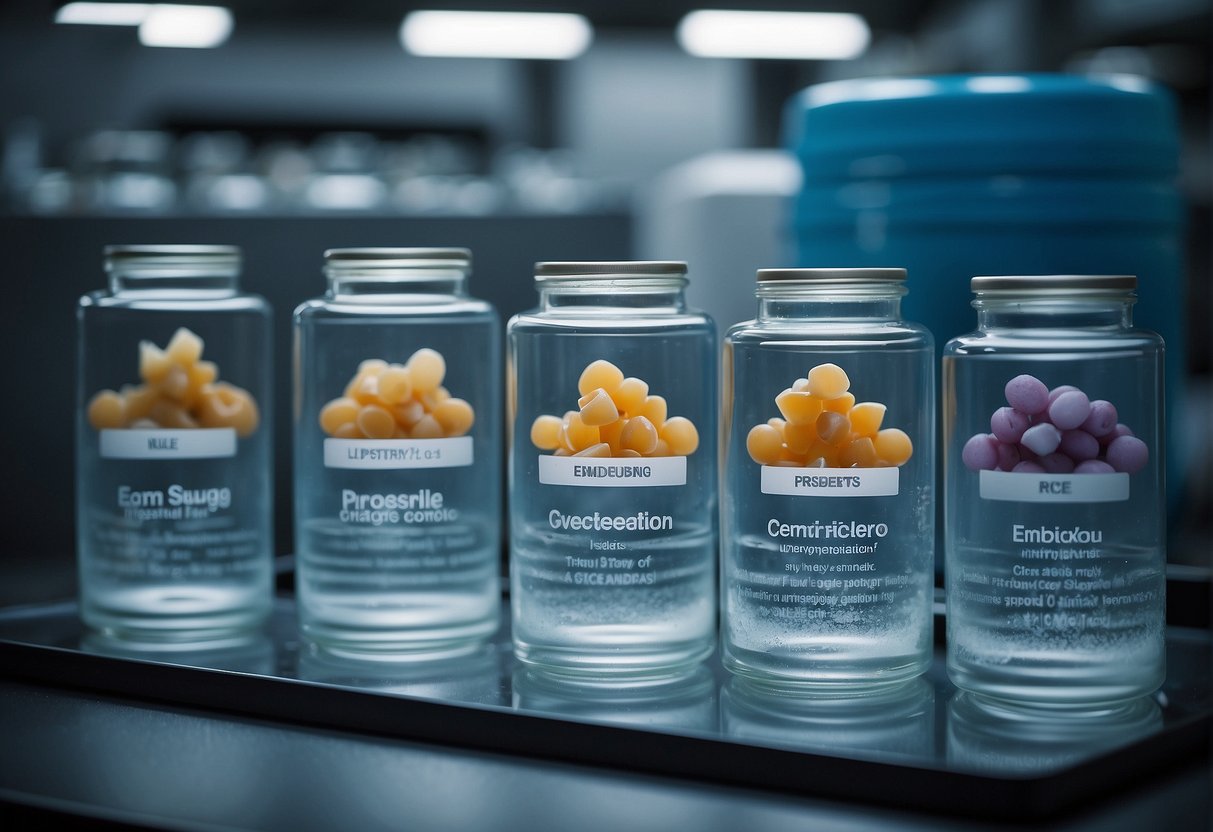Estimated reading time: 15 minutes
Recently, Alabama has thrown a legal snowball that’s turned into an avalanche of debate across the reproductive medicine landscape. The state’s Supreme Court decided that frozen embryos are children, causing raised eyebrows, scratched heads, and a variety of passionate opinions. While some folks believe embryos should be getting ready for their first school pictures, others argue they’re more like the extra frozen peas in your freezer—best left undecided until dinner time.

This decision has left everyone—the scientific community, potential parents, and that nosy neighbor who has opinions on everything—chomping at the bit to chime in. With this ruling, one of life’s biggest questions, “When does life begin?” is being scrawled into legal tablets with a vigor usually reserved for arguing about the best barbecue in town.
Exploring the implications of this ruling could have one stumbling into a quagmire of ethical, legal, and scientific conundrums faster than a clumsy kid on a newly waxed floor. As the nation watches Alabama navigate this slippery slope, debates ensue about whether IVF clinics should start handing out cigars for every embryo, or if they should remain as emotionally unattached as teenagers to a family photo session.
The Frosted Debate: Are Frozen Embryos Kiddos?

The question of whether frozen embryos qualify as children has chilled the hearts of ethicists and sparked fiery discussions in legal chambers. Strap on your snow boots; we’re trekking through the frosty terrains of biological beginnings, courtroom dramas, and the ice-cold laboratories of in vitro fertilization (IVF).
Understanding Embryonic Beginnings
At the heart of this blizzard of debate lies the embryo itself—a tiny cluster of cells not yet a snowflake’s whisper of a baby. In the IVF process, these potential frostlings are nestled in a sub-zero crib, suspended in a state that’s more ‘snooze’ than ‘sprout’. They might be as small as ice crystals, but they’ve launched a snowstorm of discussion about when life truly begins.
Legal Lingo: Frozen Embryos in Court
Courts have skated over thin ice when trying to define if these embryonic icicles should be donned in the legal onesie of personhood. There’s been a recent frosty wind blowing through Alabama, where a ruling threw snowballs at the existing definitions, labeling them as full-fledged kids. It’s a slippery slope of legal language that raises eyebrows as high as the snowdrifts in the northern tundra.
Ice Ice Baby: The IVF Process
IVF turns the biological tango into a scientific line dance, with embryos chilling out in a cryogenic hokey pokey before potentially becoming a baby. The procedure can create a blizzard of extra embryos—now there’s a pickle colder than a polar bear’s toe. In vitro fertilization often produces more embryos than are used, leading to the deep freeze dilemma: are these frosty fragments children waiting for their birthday, or just a parental dream on ice?
A Cold Reception: Society’s View on Embryos as Children

Navigating societal norms can be slippery, and when it comes to the frosty topic of embryos and personhood, opinions diverge faster than commuters at a frozen yogurt sale.
Public Chill: Perceptions of Frozen Embryos
In society’s freezer, the concept of frozen embryos as children is stacked somewhere between bewildering and a hard-to-swallow ice cube. They say it takes a village to raise a child, but does it take a cryogenic tank to store one? Society grapples with this cool conundrum, as freezer-friendly potential tots stir up a frigid debate. Some view these microscopic beings as full-fledged members of the human snowflake collection, future people on ice, just waiting for their warm debut. Others find themselves getting brain freeze just thinking about assigning car seats and college funds to entities that haven’t even had their first thaw.
Grappling with the Concept of Embryo Personhood
The idea of bestowing personhood on the petri-dish populace walks a tightrope between ethical deliberation and scientific scrutiny. On one side, you have the “They’re just cells!” camp, who believe embryos are as much children as snowmen are abominable. On the flip side, supporters raise their mittens in solidarity, proclaiming that life’s conveyor belt begins at conception, no matter how chilly the starting point. They champion the notion that personhood isn’t a status you achieve after successfully navigating the birth canal; it’s a frozen asset you have from the get-go. Still, the broader population hasn’t quite warmed up to the idea, often left scratching their collective heads, wondering if they’ll need to start knitting booties for their blastocysts.
The Legal Eagles: Courts and Embryo Status

Recent court rulings on the status of frozen embryos stir up as much debate as a turkey dinner with the in-laws. Here’s the scoop on how judges are ruling on these icy bundles of potential.
The Verdict on Frozen Embryos
Courts across the land have been scratching their judicious heads about whether frozen embryos should be sporting diapers or be chilling in the freezer section next to your favorite ice cream. They’re not just debating over brunch; this is serious legal business, folks. Lawsuits are flying like pancakes at a breakfast buffet, with plaintiffs and defendants hotly disputing the fate of these microscopic litigants.
Alabama Supreme Court’s Chilly Rulings
Down in Alabama, the Supreme Court dropped a legal snowball that’s causing a brain freeze in the IVF world. The Alabama ruled frozen embryos are children according to state law. This means that, legally speaking, these embryos are joining queues and must be RSVP’ing for their own baby showers. It’s not just any judge giving the stork directions—Justice Greg Cook himself weighed in, and this decision is more than just a passing cold front; it’s a full-on blizzard of new precedents.
Ethical Icicles: Morality of Embryo Rights

Treading through the frosty landscape of embryo rights, one might slip on the icy slope of ethics and morality. This trek involves high stakes, where the embryos’ potentiality for life hangs in the balance against the backdrop of intense societal debates, like a thriller on ice.
Frozen Nobility: The Moral High Ground
In the rink of moral discourse, frozen embryos have skated into the spotlight, pivoting between being microscopic bundles of cells and potential future humans decked in onesies. One side shouts for their right to don tiny crowns of personhood while blasting opponents with snowballs of ethical arguments. It’s a slippery surface to define where life officially begins, but the figure eight that society seems to skate around includes historical landmarks like Roe v. Wade—a case that initially seemed more about women’s choices than embryonic citizens.
Right or Wrong: Ethics in a Petri Dish
Scooch over a tad and peek into the Petri dish, where ethicists stir up quite the molecular storm. They ponder whether embryos, nestled in their chilly state of suspended animation, hold the same moral weight as children tobogganing in the snow. It’s a frosty subject, with some digging their ice picks into the argument that these early formations should have the right to grow up and experience life’s chilly breezes. Others counter with concerns over the implications for abortion rights, leaving society to skate in tight circles, searching for the ethical triple axel that will land them safely on solid ice.
Deep Freeze Dilemmas: Challenges in IVF Treatments

When it comes to the world of in-vitro fertilization (IVF), some may say it’s more complex than a soap opera plot twist. At the heart of these twists are frozen embryos, toeing the line between science and sentimentality.
Conception Confusion: Navigating Fertility
In the arena of fertility, confusion often reigns, and the IVF treatments don’t make things simplex, that’s for sure. Clinics become a stage for high-stakes drama where the understudy—science—strives to lead. For those in the audience (read: patients), the plot involves intricate procedures and moral mazes. A central question they grapple with is whether their frozen embryos at the fertility clinic have a role beyond biological blueprints.
- Character Bios:
- Frozen Embryos: Tiny protagonists in suspended animation.
- Patients: Hopeful individuals with more investment than a Wall Street tycoon.
Cold Comfort: Coping with IVF Challenges
Now, they say comedy comes from tragedy, and coping with IVF challenges is akin to performing stand-up at a silent retreat—it’s no easy feat. The emotional roller coaster has many twists, with infertility issues that test even the steeliest of nerves. Patients float between hope and reality in a numb daze that would have even the most stoic ice sculptures shedding a tear.
- IVF Roadmap:
- Phase 1: Optimism, as patients check in.
- Phase 2: Tension, as treatments proceed.
- Phase 3: Uncertainty, where outcomes are awaited.
In the cellular soap opera that is IVF, every actor, from medical staff to hopeful would-be parents, play their role with hopeful hearts and furrowed brows, wondering if today marks a momentous occasion or just another rehearsal.
Parental Frostbite: The Rights of Embryo Parents

In the frosty expanse of legal and ethical ice-fields, embryo parents are grappling with their rights over their cryo-preserved offspring. As law and technology embark on a chilly tango, the dance floor of reproductive rights has never been more slippery.
Nursery on Ice: Parental Authority
When it comes to the chilling decision of what to do with their frozen embryos, parents often find themselves at a crossroads. While some may see their chilly charges as a chance for future children, others might view them as pieces in a complex legal puzzle. The fierce autonomy over these potential bundles of cell-side joy is nothing short of a custody battle over who decides the fate of these embryos during fertility treatments. The question at stake: Do they get to swaddle or abandon the petri dish nursery?
Custodial Skirmishes in the IVF Tundra
In the icy realm of IVF, not all skirmishes end in a cold war. When relationships thaw and split, the tussle over the frozen potential descendants becomes a custodial snowball fight of epic proportions. The legal tug-of-war pitches parents against each other, with courts refereeing whether these frozen bits should be wrapped in little blankets and brought home, or if they remain suspended in their frosty sleep, just a snowflake’s throw away from becoming a baby. The harrowing journey through the legal blizzard leaves many yearning for a cup of hot cocoa and a clear understanding of what their reproductive rights really are.
The Fertility Frontier: Advances in Repro Tech

As the diplomatic debate on whether frozen embryos should wear diapers continues, we leap into the spellbinding world of reproductive technology. New advances are redefining the babymaking bazaar, and it’s not just storks getting upgrades; scientists and healthcare providers are in on the action too.
Innovation Avalanche: The Future of IVF
With reproductive science sprinting faster than a sperm toward an ovum, in vitro fertilization (IVF) is getting a high-tech facelift. They once thought the petri dish was the pinnacle of prenatal matchmaking, but new techniques are turning IVF into a veritable love boat for gametes. One such trend is the “freeze-all” strategy, endorsed by findings from notable researchers, suggesting that by embracing their inner Elsa and freezing all embryos from an IVF cycle, one can reduce complications like ovarian hyperstimulation syndrome (OHSS). This may give the U.S. Supreme Court something to puzzle over when addressing the legal status of these popsicle tots.
Chill Pills: New Technologies in Reproduction
Reproductive wizards have concocted new spells in the form of advanced cryopreservation methods. With these techniques, they’re not just freezing peas and carrots but potential progeny, ensuring that embryo survival rates are as snug as a bug in a rug. The art of icing embryos has given rise to over 25,000 live births from frozen embryos as of 2019, turning health care practices into veritable baby boom factories. What’s next, prenatal timeshares? Only the future of reproduction tech will tell!
A Frosty Reception: The Public and Embryo Personhood

The debate around frozen embryos and their legal status is cooling down social media platforms but heating up legislative floors. Amidst ice puns and snowflake emojis, the public’s view on whether these microscopic entities should be granted the rights of a child has become a slippery slope of opinions.
Snowball Effect: Public Opinion on Embryo Rights
Public opinion on embryo rights seems to be rolling downhill like an uncontrollable snowball. Recently, an Alabama Supreme Court ruling crystallized the notion that frozen embryos deserve the moniker ‘children.’ But does the general public agree? Polls conducted across various demographics show a blizzard of differing views, with discussions on social media platforms making it apparent that the chilly subject has people wrapped up tighter than a snowman in January.
- Agree: A solid chunk of comments suggests personhood should start at conception, no matter the frosty state of the embryo.
- Disagree: Others argue that legal personhood should only kick in once the embryo isn’t in deep freeze anymore.
Frozen in Time: Changing Norms and Attitudes
When it comes to public policy and the concept of personhood for frozen embryos, society’s thoughts are like a snowflake: unique and intricate. The blustery debate asks whether we’re seeing a new ice age of public policy or if these are merely flurries that won’t stick. Reference to historical approaches shows a thaw in traditional views, with precedent treating embryos more like property than people. A slight warming trend, however, is evident:
- A turn towards recognizing potential life in the legislative forecast.
- A few flakes of consideration for the rights of embryos, signaling a possible shift from the status quo.
Baby Blocks: The Legal Implications of Frozen Embryos

When embryos get the cold shoulder from their petri dish and end up in court, things can get slippery. Legal eagles have been circling this chilly topic, with each verdict potentially reshaping the landscape of reproductive medicine and associated rights.
Judicial Frost: Precedents and Embryo Law
The legal status of frozen embryos has been as clear as a a blizzard until recent courts began defrosting some guidelines. For starters, there’s no universal lawbook for these microscopic ice cubes. They’ve been at the center of heated debates, where the crux often melts down to whether embryos should have the same rights as people post-Roe v. Wade. Cases like Dobbs v. Jackson Women’s Health Organization turn up the heat, especially in states aiming to redefine personhood starting at conception, ticking off a flurry of lawsuits.
- Precedents: Varies by state, often linked to abortion rights debates
- Connection to Roe v. Wade: Usually indirect, but influential in broader discussions of reproductive rights
Embryos on Trial: Notable Legal Battles
Taking a stroll down the chilly aisles of the embryo legal battles, one might slip on cases that range from ‘snowflake babies’ to bizarre custody disputes. Lawsuits in this realm often resemble wrongful death suits, albeit with embryos in the plaintiff’s chair. Tensions rise faster than a thermometer in a heatwave, as courts navigate between potential lives and established ones. Some argue that if embryos are ‘snowflakes’, then shouldn’t snowflake wrongful death be on the table?
- Wrongful Death: Controversially applied to embryos in legal settings
- Notable Legal Battles: Include disputes over embryo custody, rights, and wrongful death claims
Embryos on Ice: Understanding Storage and Risks
In the freezer showdown of the century, embryos are bobbing in their icy liquid nitrogen baths, dreaming of a future outside the deep freeze. But as they chill out, risks lurk in the cold shadows.

Cold Storage: Preserving Future Families
These potential totsicles are hanging out in high-tech storage facilities, where they’re kept cozier than a penguin in a parka at a downright brisk -196 degrees Celsius. This isn’t your grandma’s freezer; it’s a fancy affair with advanced security systems to keep future families on ice. Fertility treatments have come a long way, and these icy nurseries allow want-to-be parents to hit the pause button, ensuring their genetic legacies are lined up like little ducks in a frosty row.
Chilling Effects: Risks in Freezing Embryos
But wait, there’s a plot twist in this cold tale. Freezing embryos isn’t a perfect science. Enter the health law stage left, which often scratches its head over whether these embryos should be treated as children or a property. There’s a host of risks when it comes to laying embryos on ice. Think changes in the epigenome, the possible impact of cryoprotective agents, and even the awkward family debate over who the embryos should go home with if things go south. It’s a slippery slope when embryos play freeze tag.
Chilly Endings: The Fate of Unused Embryos

When the journey of in vitro fertilization takes a frosty detour, the destination for unused embryos can become a slippery slope. They sit in a limbo colder than a penguin’s picnic, encapsulated in frost, waiting for a decision that could mean their warm welcome into a womb or a final cold goodbye.
Cold Decisions: Disposing of Embryos
The decision to dispose of embryos isn’t simply about turning off the freezer; it’s laden with ethical snowdrifts and legal icebergs. Couples might find themselves in a brain freeze when considering the fate of their potential progeny. Under the wrongful death of a minor act, certain states could start treating these embryonic ice cubes like full-fledged snowflakes with rights and protections. This raises the stakes higher than the tallest snowman when determining their eventual melt-down or eternal frost.
Final Frost: The Legalities of Embryo Disposition
Some states bundle up their laws in the name of fetal personhood, and the legal landscape for frozen embryos resembles a freshly zambonied ice rink – slick, smooth, and hard to navigate. A ruling in Alabama (Alabama ruled frozen embryos are children) has introduced a chill in the air, implying that these microscopic flakes could be considered children with implications as wide-reaching as a winter blizzard. This might send a cold shiver down the spine of abortion rights advocates since such frosty legislation could turn the tides of reproductive autonomy into a snow globe turned upside down.



